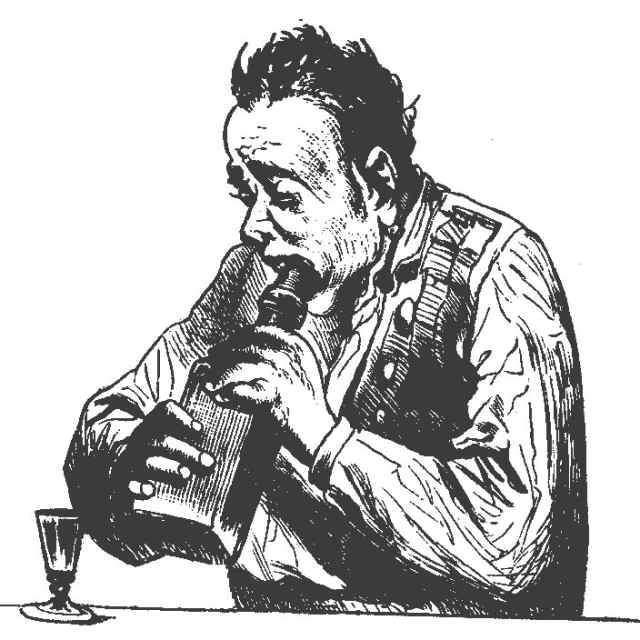beer bash or
PENTECOST?
…[There is a high] like no other, with never a letdown or a swordsharp afterkick. More about it shortly, but a look at binge drinking in clear-sighted reality first.
Alcohol abuse—and binge drinking in particular—are plainly serious problems at Yale and many other campuses. A Yale Daily News editorial last April 5th said, “When it comes to binge drinking, it is not a secret that Yale students do end up at University Health Services as a result of alcohol poisoning. And many Yale students recognize that the number of those treated does not even closely represent the extent of binge drinking at Yale.”
Beer Bash or Pentecost?
Alcohol abuse—and binge drinking in particular—are plainly serious problems at Yale and many other campuses. A Yale Daily News editorial last April 5th said, “When it comes to binge drinking, it is not a secret that Yale students do end up at University Health Services as a result of alcohol poisoning. And many Yale students recognize that the number of those treated does not even closely represent the extent of binge drinking at Yale.”
National research double-underscores that. A 1997 Harvard survey found that nearly half of college students had gone on a drinking binge within the prior two weeks. Binge drinking qualifies as a college epidemic.
Why the persistent pull of alcohol—and the persistence of alcohol abuse?
An occasional drink has its appeal. At its best, it may help people break the ice, talk, laugh, and be happy with others. “Wine…gladdens the heart of man,” the Bible observes. (Psalm 104:15)
Medical research also suggests a little alcohol can do a body good. But research also reveals that over-consumption (more than one or two drinks a day) poses personal and public health hazards. Given this, “the American Heart Association cautions people NOT to start drinking…if they do not already drink alcohol. Consult your doctor on the benefits and risks of consuming alcohol in moderation.”
Some can’t control their consumption at all; many more find it a real challenge. Predicting how an individual will handle alcohol is nearly impossible.
Abandoning any moderation, an astonishing number of students habitually get themselves drunk. Talk, friends and a glass of wine just doesn’t do it for them.
Most often, the result showcases plain stupidity. Too many drinks. Incoherent talk, incoherent actions. An insult, maybe a shove or a wide punch. But sometimes a blow lands. Memory of an evening is lost. A friend rolls his eyes when you ask what you said. A stranger passes you and mutters, “What a jerk!” You don’t remember getting that bruise. You don’t recognize the person you wake up with!
Too often, inexperienced and underaged drinkers painfully discover alcohol poisoning. Some die.
Despite the obvious damage, there’s a persistent, perverse allure—and then addiction—to drunkenness for too many students. This used to be called alcoholism, and that’s what it still is.
That drinking binges are so popular—in spite of the cost—suggests a certain hunger for something they promise, however treacherously.
Life presents a continuing challenge to moderation and self-possession. We face real issues of freedom and choice, disguised as beer bashes and Jello shots. Am I a free person, seeing and choosing what’s good for me and for others, or am I a slave to something that masters me? With substance abuse, this is not fanciful personification of a lifeless thing, but the real experience of any addict.
There’s an alternative to all of this—one you haven’t imagined.
There is a cure for the hunger that substance abusers assault with alcohol and drugs, and it goes much farther. The Bible prescribes it as the ultimate cure for drunkenness. Though you may think it absurd at the outset, this alternative is as fundamental to intellectual and emotional life as breathing is to bodily life. It is captured in these few words of Scripture:
“Do not get drunk on wine, which leads to debauchery. Instead, be filled with the Spirit.” (Ephesians 5:18)
“Do not get drunk on wine, which leads to debauchery. Instead, be filled with the Spirit.”
Ephesians 5:18

“Be Filled With the Spirit”
The first imperative is easy enough to comprehend. The second needs some explaining. God the Father promised this promise. Jesus the Son delivers it to His own, to anyone who will receive.
We were designed (yes, designed) to be filled with the Spirit of our Creator as a fact of life. But very few have any idea at all what this means.
Moses, one of history’s greatest leaders, provides an example of a man filled with the Spirit of God (Numbers 11:25). For certain men with him, it meant an endowment of artistic skill (Exodus 35:31ff).
For Joshua, his successor, it meant an enduement of leadership and wisdom (Deuteronomy 34:9). For others, it meant a gift of prophecy to communicate God’s mind to men (see Numbers 24:2, 1 Samuel 10:10). For a series of Biblical champions, it meant fuel for acts of military and political courage (for example, Judges 11:29, 14:6, 1 Chronicles 12:18). The Spirit of God came upon King David, and he composed scores of psalms (songs) still published and prized by much of the world.
In the Old Testament record, only a few individuals experienced an infilling of the Spirit of God. But the prophet Joel (Joel 2:28-29) declared God’s promise to make this gift widespread:
I will pour out my Spirit on all people.
Your sons and daughters will prophesy,
your old men will dream dreams,
your young men will see visions.
Even on my servants, both men and women,
I will pour out my Spirit in those days.
A Gift—Promised to All Believers
Peter, the apostle, friend and disciple of Jesus, began to see this promise fulfilled as he explained to a crowd of thousands what was taking place at the Jewish harvest festival of Pentecost in Jerusalem. One hundred twenty pioneering Christians had suddenly been filled with the Holy Spirit and praised God publicly before that same crowd—in multiple languages they had never learned, as the Holy Spirit gave them words. So Peter said:
“Repent and be baptized, every one of you, in the name of Jesus Christ for the forgiveness of your sins. And you will receive the gift of the Holy Spirit. The promise is for you and your children and for all who are far off—for all whom the Lord our God will call.” (Acts 2:38)
A new chapter of history opened that day. Once rare, an infilling of the Spirit of God was now declared a gift promised to all believers. It became the normal and expected experience of early Christians (see Acts 8:17; 10:44; 19:6). The effects were immediate, supernatural, and long-lasting.
The early Church received this gift on Jesus’ instructions: “Do not leave Jerusalem, but wait for the gift my Father promised…. For John baptized with water, but in a few days you will be baptized with the Holy Spirit,” and “I am going to send you what my Father has promised; but stay in the city until you have been clothed with power from on high.” (Acts 1:4-5; Luke 24:49)
A new chapter of history opened that day. Once rare, an infilling of the Spirit of God was now declared a gift promised to all believers. It became the normal and expected experience of early Christians (see Acts 8:17; 10:44; 19:6). The effects were immediate, supernatural, and long-lasting.
The early Church received this gift on Jesus’ instructions: “Do not leave Jerusalem, but wait for the gift my Father promised…. For John baptized with water, but in a few days you will be baptized with the Holy Spirit,” and “I am going to send you what my Father has promised; but stay in the city until you have been clothed with power from on high.” (Acts 1:4-5; Luke 24:49)

A Partnership of Unequals
But what does this have to do with getting drunk? And how is it an alternative?
The answer begins with what the Holy Spirit brings into a life.
First, a direct and intimate relationship with God, who lives within a believer by His Spirit. This is life built on the foundation of Jesus Christ’s sacrifice of Himself on the cross for our sins. It begins when we receive Jesus personally as Savior. Jesus reconciled us to God so we could be a fit dwelling for God by His Spirit.
If such a notion doesn’t strike a non-Christian as absurd, it might be alarming instead, suggesting those lurid movie posters that use the word “possessed.”
But this is God—not a second-rate Hollywood producer. God created us in His own image (Genesis 1:27), and His own respect for the sovereignty and integrity of a human soul is altogether disarming. The Holy Spirit’s inward working is characteristically gentle, not overpowering. He enables a profound partnership of unequals, where the stronger partner makes extraordinary allowances and provisions for the weaker. Declining to force His way, the Holy Spirit has been called a “Gentleman,” asking our consent and expecting initiative from us.
God does not ask us to cede functional control of life and person to anyone—not even to Himself (and much less to a bottle of liquor!) To be led by the Spirit is no abandonment of thought, judgment, or action. Rather, we are to develop and use our gifts to their fullest: “Love the Lord your God with all your heart and with all your soul and with all your mind and with all your strength.” (Deuteronomy 6:5 and Mark 12:30)
God’s Holy Spirit works with us and within us, not instead of us. From deep within the spirit of a man, the Spirit supplies understanding, wisdom, knowledge, and more to a man’s own faculties as the man thoughtfully, diligently, and prayerfully uses them. Jesus promised that “the Counselor,…whom the Father will send in my name, will teach you all things,” and, “When he, the Spirit of truth, comes, he will guide you into all truth.” (John 14:26, 16:13) What a gift!
Besides truth, the Spirit works from within to help the believer build godly character, the “fruit” of one’s living by the Spirit: “The fruit of the Spirit is love, joy, peace, patience, kindness, goodness, faithfulness, gentleness and self-control.” (Galatians 5:22)
Now contrast these fruits, as the Bible does, to the results of a life abandoned to following one’s own natural inclinations (note the “drunkenness”):
“The acts of the sinful nature are obvious: sexual immorality, impurity and debauchery; idolatry and witchcraft; hatred, discord, jealousy, fits of rage, selfish ambition, dissensions, factions and envy; drunkenness, orgies, and the like. I warn you, as I did before, that those who live like this will not inherit the kingdom of God.” (Galatians 5:19-21)
Power—Real Power
These are described as our nature, doing what comes naturally. If this is so, we are up against something very strong within us—as any alcoholic knows painfully well. To overcome these inclinations, we need power.
That is exactly what Jesus promised in the Holy Spirit: “Stay in the city until you have been clothed with power from on high.” (Luke 24:49)
Not power to manipulate others. Not power to get personal wealth—all the stuff of greedy fantasy.
Power, instead, to live the life God has called His people to live. Power given by the Holy Spirit, as He chooses, to express God’s own mind to the real benefit of others. This kind of expression marks those God has filled with His Spirit.
Peter, who was frightened by a servant girl into denying Jesus just days earlier, stood up at Pentecost. Filled with the Holy Spirit, he declared boldly and eloquently to thousands the resurrection of Christ—and three thousand were converted to faith that day.
The early Church saw how the Holy Spirit gave believers a variety of supernatural expressions and action—for the building up of fellow believers and uniting them into a community highly respected by their neighbors. Paul the Apostle declared the variety of these spiritual gifts, which truly exemplify Jesus’ promise of “power from on high:”
“The manifestation of the Spirit is given to each one for the profit of all: for to one is given the word of wisdom through the Spirit, to another the word of knowledge through the same Spirit, to another faith by the same Spirit, to another gifts of healings by the same Spirit, to another the working of miracles, to another prophecy, to another discerning of spirits, to another different kinds of tongues, to another the interpretation of tongues. But one and the same Spirit works all these things, distributing to each one individually as He wills.” (1 Corinthians 12:7-11)
Helped by these gifts of the Holy Spirit, Messiah Jesus’ followers become “a dwelling in which God lives by his Spirit.” (Ephesians 2:22)
Since the Holy Spirit’s first outpouring, people have tried to explain it away. The more cynical witnesses at Pentecost accused the disciples of being drunk. Peter pointed out that it was only 9 AM! Some Christians decline to seek a baptism in the Holy Spirit, told that the completion of the Bible centuries ago renders further revelation unnecessary, and a filling by the Holy Spirit, unavailable. All these attitudes lead to the same impoverishment.
To ask God for a baptism in the Holy Spirit may still sound questionable, even dangerous. One may say, “I’ve never been here before; how can I know that I won’t step into something strange, uncontrollable, and harmful to me? Jesus reasoned: “Which of you fathers, if your son asks for a fish, will give him a snake instead? Or if he asks for an egg, will give him a scorpion? If you then, though you are evil, know how to give good gifts to your children, how much more will your Father in heaven give the Holy Spirit to those who ask him!” (Luke 11:11-13)
Can you imagine the joy of receiving from God through your spirit understanding, words to speak, even the power to heal an afflicted person—all apart from your own cleverness—but with your full, conscious, willing partnership? Can you imagine the comfort of a life-long supply of love, joy, peace, goodness, gentleness, patience, and kindness, as you follow Christ and live by the Spirit? Nothing compares with this “river of living water,” as Jesus described it. You will never need to take refuge in a bottle, a needle, or a pill! What’s more, you will be a blessing to friends, family and all around you.
So ask! Even if you are not a Christian yet, come!
Is there a safe, satisfying alternative to alcohol? You bet there is! We’re sincere, sober, and delighted to say there is release, rest and peace in receiving Jesus Christ as Savior, and then in receiving the Holy Spirit He promised. Completeness, confidence, a way to really break the ice, a way to meet some of the best people on earth—power to live an unashamed life—these are the results of knowing God, as we can testify to you.
Why wait? Don’t live under brownout conditions. “Don’t be drunk with wine, but be filled with the Spirit!”
Jaan E. Vaino, Columbia U. ’83
© 2001 The Yale Standard Committee

